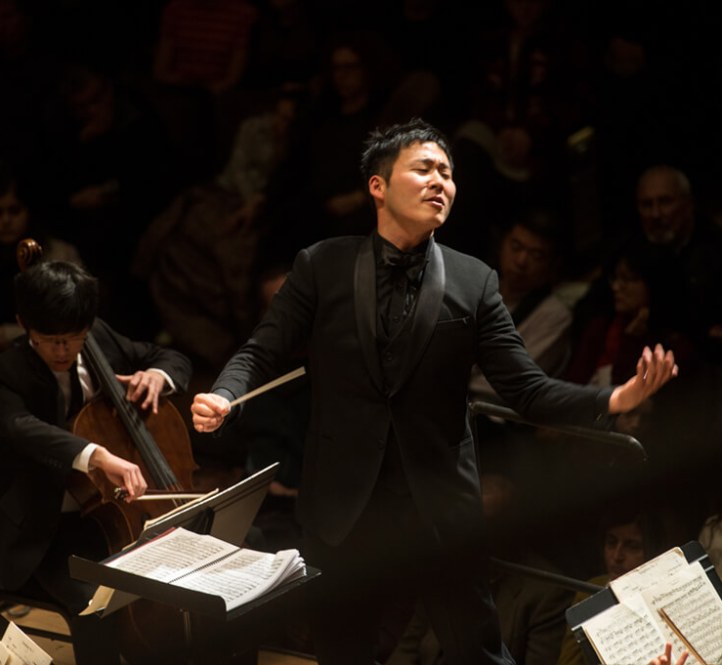Pro Arte Orchestra wraps season with delightful, wide-ranging invitation to the dance
Sometimes short and sweet adds up to much more than the sum of its parts. That’s what happened during Pro Arte Chamber Orchestra’s season finale Sunday afternoon at Second Church in Newton.
On paper, the sixty-minute-long program of music for strings was tied together by the theme of dance. In practice, though, the concert, deftly led by Boston Symphony Orchestra assistant conductor Earl Lee, highlighted an array of stylistic, technical, and expressive connections that tightly united music written across 341 years.
To be sure, the afternoon’s earliest selection, Franz Biber’s Battalia à 10, might have been written yesterday. But it wasn’t—composed in 1673, its episodes of foot stomping, extended instrumental techniques, and woozy atonality certainly sounded du jour. Only the score’s polite phrasings, neatly sequential passagework, and surprisingly cheery battle sequence shouted 17th-century.
Otherwise, this ten-minute-long depiction of soldiers gathering, carousing, fighting, and mourning their losses came across with fresh immediacy. That was especially true of concertmaster Julia Cash’s serenely contemplative account of the pivotal Aria.
Likewise captivating was Pro Arte’s traversal of Béla Bartók’s exuberant Romanian Folk Dances. Written in 1915 and orchestrated two years later, this is music that features the Hungarian composer at his earthiest, with six movements brimming with contrasts of energy, color, and texture.
Yesterday’s reading was admirably lean and invigoratingly secure: Lee’s attention to balances meant that the Dances’ inner voices emerged with winning clarity. So did Pro Arte’s feel for the music’s shifting states of character.
The outer movements bristled with rhythmic vitality, especially the concluding “Mărunțel.” At the same time, the ensemble delivered beautifully flexible phrasings in “Brâul” and Cash’s keening solos in “Pê loc” soared.
Equally fluent—but coming, stylistically, from a completely different place—was the group’s performance of Florence Price’s Andante moderato. A string orchestra adaptation of the first movement of her 1929 String Quartet in G, the piece is full of Price’s trademark lyricism: parts of it, in fact, sound like something Grieg or Sibelius might have written had they been transplanted from Scandinavia to the American Midwest.
On Sunday, the music’s seams showed as clearly as ever (Price, for all her melodic gifts, was no master of transitions), but even that didn’t detract from the warm fluency of the afternoon’s reading. In fact, much of it was close to ideal: for tonal blend, balance, and grasp of the score’s expressive essence, Lee and Pro Arte left little to be desired.
Equally fervent were the afternoon’s other two offerings, Kenji Bunch’s Supermaximum (written in 2011) and Michi Wiancko’s reworking of Francesco Geminiani’s La Folia (from 2014).
The former, which is based on chain-gang work songs in the Depression-era South, channeled the folksiness of the Bartók with the innovative techniques of the Biber. Drawing on theatrical extended techniques (foot stomping, again, and drumming on instruments), it’s a piece that’s at once logically structured, expressively direct, and accessible without being cheap.
Pro Arte’s account was full-bodied, highlighted by the resonant playing of the viola section. It was also boldly colored and, in the score’s registral extremes, conspicuously impassioned.
Much the same might be said for the afternoon’s finale, Wiancko’s repurposing of Geminiani’s adaptation of music by Arcangelo Corelli. Granted, Corelli’s original chord progression is virtually indestructible. That said, Wiancko puts it through its paces, exploring all sorts of sonorities and styles before ending the piece with a sort of Cuban danzón.
On Sunday, the orchestra took to it all with spirit and energy, the score’s buoyant dialogues unfolding playfully while Lee ensured the larger interpretation never got sidetracked from its dancing impetus. It was a fitting performance of a piece that sounds, at once, fresh, invigorating, and original—though, as the Biber reminded, even the most singular music has its roots.
Pro Arte Chamber Orchestra opens next season with Classical Lines 3 p.m. October 29 at Second Church in Newton. proarte.org
Posted in Performances




